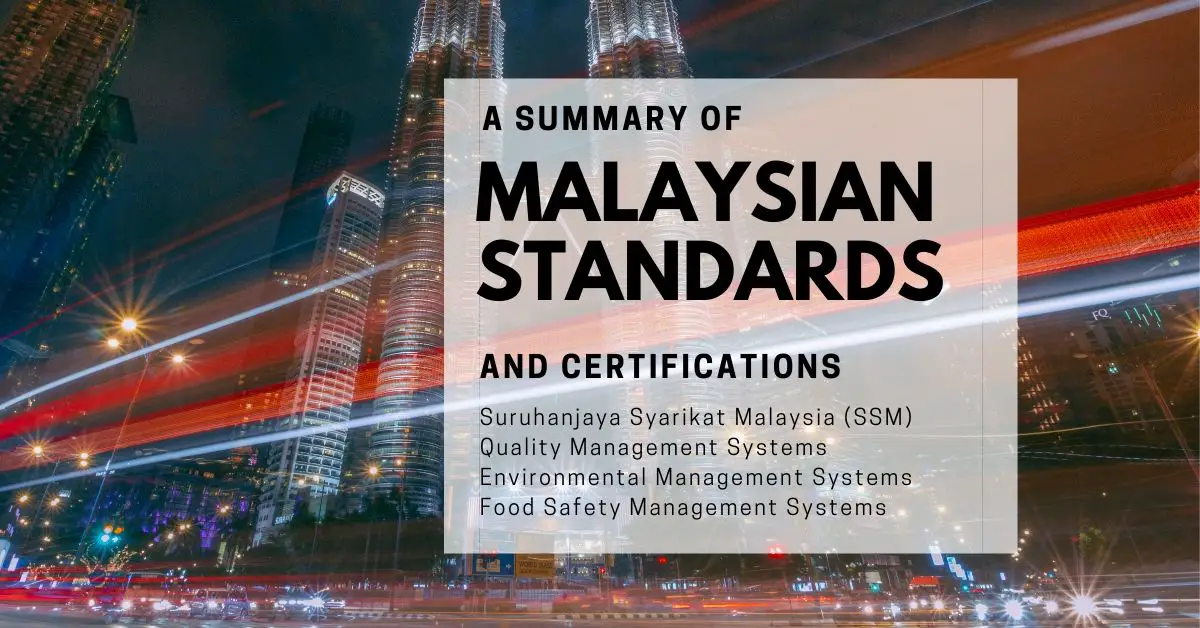
For those who would like to start a new business/company in Malaysia, here are some of the most popular certifications and standards in Malaysia that you would probably need to know. While some of the standards are specific to a certain industry, many of the standards are generic and should be implemented into your company or business.
Suruhanjaya Syarikat Malaysia (SSM) Business Registration
The Companies Commission of Malaysia (Suruhanjaya Syarikat Malaysia or SSM in Malaysia) is a statutory body which regulates companies and businesses. SSM, which came into operation on 16 April 2002, is a statutory body formed as a result of a merger between the Registrar of Companies (ROC) and the Registrar of Businesses (ROB) in Malaysia.
The main activity of SSM Malaysia is to serve as an agency to incorporate companies and register businesses as well as to provide company and business information to the public.
As the leading authority for the improvement of corporate governance, SSM fulfils its function to ensure compliance with business registration and corporate legislation through comprehensive enforcement and monitoring activities to sustain positive developments in the corporate and business sectors of the Nation.
You might be interested to read our article on How to Register a Company in Malaysia with SSM (Step-by-step Guide).
MS ISO 9001: 2015 – Quality Management Systems
An organisation has established a systematic approach to instill quality by ensuring that their products meet customer requirements. This does not mean that the product is conforming to product standards. It means that the products are being produced through processes which have consideration for quality in the aspects set out by the standard.
MS ISO 14001: 2015 – Environmental Management Systems
An organisation has established a systematic approach to protect the environment, to prevent pollution (air, water, land, noise and nuisance), and to improve their environmental performance. By complying with the standards helps relevant organisations to comply with legal requirements set out by Environment Quality Act 1974 (Act 127) and the relevant regulations. EMS also form the building block for Green Supply Chain Management (GSCM) and by complying with EMS, organisation are complementing GSCM.
MS 1722:2011 & OHSAS 18001:2007 – Occupational Health and Safety Management Systems (OHSMS)
An organisation has established a systematic approach to control and improve its occupational, health and safety performance. This will contribute to protection of employees from work hazards, injuries, ill health, diseases, near misses and fatalities. By complying with the standards helps relevant organisationsto complywith legal requirements set out by Occupational, Safety and Health Act 1994 (Act 514), Factory and Machinery Act1967 (Act 139) and Petroleum (Safety Measures) Act 1984 (Act 302) and their relevant regulations.
MS ISO 22000: 2012 – Food Safety Management Systems (FSMS)
An organisation has established a systematic approach to demonstrate its ability to control food safety hazards to ensure that food is safe at the time of human consumption. By complying with the standards helps relevant organisations to comply with legal requirements set out by Food Act 1983, Act (281), Food Regulations 1985 and other requirements in food safety and handling.
Who should apply? Food manufacturer, retailers and service operations or any other organisation involved in the food chain
MS ISO/IEC 27001: 2007 – Information Security Management Systems
An organisation has established a systematic approach to protect especially sensitive information from wide range of threats to ensure business continuity, minimize business damage due to attacks, leakages and natural disasters, maximise return on investment and business opportunity. It encompasses people, processes and information technology systems. In the context of this standard, the term information includes all forms of data, documents, messages, communications, conversations, recordings, and photographs.
MS ISO 50001: 2011 – Energy Management Systems
An organisation has established a systematic approach to continually improve its energy performance, energy efficiency and sustainable energy use and consumption. By complying with the standard lead to reduction in greenhouse gas emissions, energy cost and other environmental impacts. EnMS also form the building block for Green Supply Chain Management (GSCM) and by complying with EMS, organisation are complementing GSCM. The ASEAN Energy Management Scheme (AEMAS),world’s first regional certification systems for energy managers and energy end-users specify EnMS complying with ISO 50001 as basic requirement for 1-starrating for its certification scheme. The scheme is implementing 3-star rating.
MS 1500: 2009 – Halal Food
The Malaysian Standard entitled ‘Halal Food: Production, Preparation, Handling and Storage – General Guide (MS 1500:2009) was developed under the Malaysian Standard Development System, under the wing of Department of Standardization Malaysia (DSM), Ministry of Science, Technology and Innovation.
This standard contains practical guidelines for the food industry on the preparation and handling of halal food (including nutrient enhancers). It aims to set the ground rules for food products or food businesses in Malaysia. It will be used by JAKIM as the basis for certification whilst other requirements will also be taken into account to complete the certification process.
Refer Malaysian Halal Certification Procedure Manual for more information.
More Information
Please visit Department of Standards Malaysia to get more information about Malaysian standards. You can also search and purchase the Standards document through Malaysian Standards Online portal.
More international standards are available at www.iso.org.
You should visit Food Safety and Quality Division if you are a food manufacturer, retailer and service operations or any other organisation involved in the food chain.

